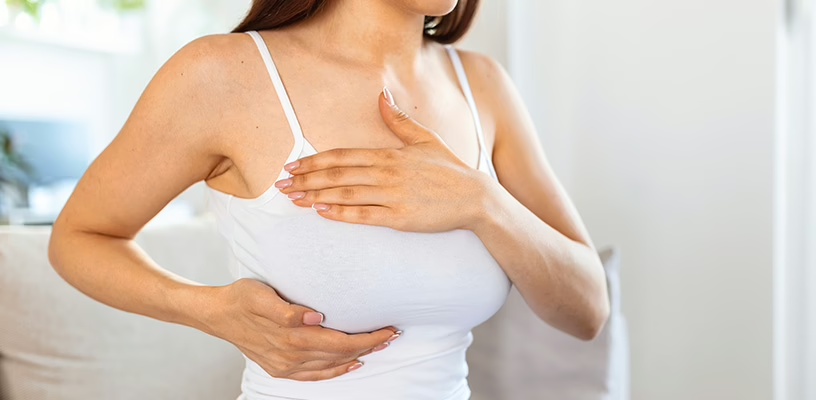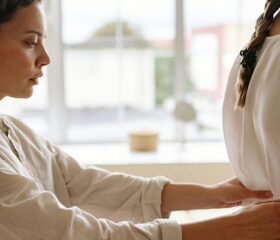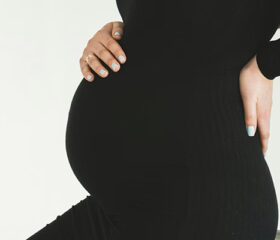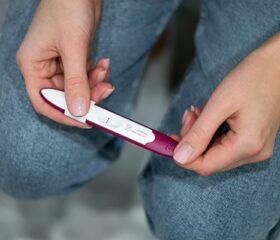Breast Changes and Pain During Pregnancy: How to Cope
While you probably expected your breasts to grow somewhat larger during pregnancy, you might not have expected them to get so achy!

Breast tenderness is often one of the earliest pregnancy symptoms, sometimes with further increases in sensitivity as you get closer to meeting your baby.
Let’s take a closer look at what will happen to your breasts during pregnancy and how you can minimize the irritation and tenderness coming your way.
How much breast pain can you expect during pregnancy?
Not everyone experiences the same level of breast pain during pregnancy; as with all symptoms, it varies from woman to woman and sometimes pregnancy to pregnancy.
The pain usually isn’t debilitating (see your doctor if it is), but it’s very common to feel some degree of discomfort. You may also feel a sense of “heaviness” or tingling. Expect nipple sensitivity to enter the mix.
How hormones cause breast tenderness
As with most of the bodily changes that may disrupt your life during pregnancy, your hormones are the primary culprits behind breast tenderness.
You can mainly credit estrogen and progesterone, which increase blood flow to the breasts and kick-start the growth of milk glands and fatty tissue. This is your body’s way of preparing for breastfeeding. 1
Is breast pain always a sign of pregnancy?
No, there are many other causes of breast pain and tenderness. In particular, since it’s also often a symptom of premenstrual syndrome (PMS), it can be tricky to discern whether it’s the result of PMS or pregnancy.
If you’re trying to figure out if you’re pregnant, pay attention to whether your breast tenderness is also accompanied by more sensitive nipples, which PMS usually doesn’t cause.
If you notice other pregnancy signs (in particular, a late period), rather than going by your symptoms alone, you should take a pregnancy test to confirm things.
How your breasts will change during pregnancy
Pregnancy brings plenty of changes to your breasts. For starters, you can expect them to grow larger as your pregnancy progresses—maybe even bumping you up one or two cup sizes, especially if this is your first time.
You’ll also probably have to deal with accompanying itchiness and stretch marks. It’s a good idea to buy bras incrementally, with stretchy nursing bras entering the lineup closer to your delivery date.
You also might get: 2
- Perkier nipples: You’ll have more sensitive and pronounced nipples with darker, larger areolas. Don’t be surprised if you notice tiny bumps rising in the area, too. These are Montgomery’s tubercles, the oil glands responsible for lubricating the area when you breastfeed.
- More prominent veins: Your skin may suddenly look like it’s hosting a river system as a network of blue veins emerges. This is due to all those nutrients and fluids rushing to support your baby.
- Leakage: Say hello to colostrum, the first, nutrient-rich breast milk your body will produce. This early sign of breast milk coming in during pregnancy can arrive as early as your second or third trimester. It’s not uncommon for some women to bypass this leaky period.
- Potential lumps: While these are less common, you should still be on the lookout for breast bumps. If they show up, they’ll probably be harmless milk-filled cysts (galactoceles) or benign tumors (fibroadenomas). Call your doctor if you notice any lumps that are hard or persistent (lasting more than 2 weeks, especially if they’re continuing to enlarge).
How long can you expect breast pain to stick around?
Look for some initial tenderness during your first trimester. From there, the discomfort will usually taper off as your body gets used to your hormonal changes. Some women, however, don’t experience this and have to put up with breast pain throughout their pregnancy. 3
Even if your discomfort does lessen, you can expect it to pop back up towards the end of your third trimester as your body gears up for lactation.
You might still have to deal with breast pain after pregnancy
When your breasts start producing milk, they may swell. If you don’t express your milk sufficiently, your breasts can become too full, known as breast engorgement. This can cause significant swelling, hardness, and pain.
How to treat breast pain during pregnancy
One of the best things you can do to combat breast pain is get a well-fitting, comfortable bra. Opt for soft, seamless cotton without underwire.
Sports bras can also be lifesavers, especially during exercise, although not all women find them comfortable (they can be tight). Consider letting someone measure you for a maternity or nursing bra. 4
“Soft and comfortable” will continue to be the name of the game when choosing a sleep bra. If you’re a restless sleeper, you’ll appreciate the gentle support and minimal irritation when you move.
You should also stock up on loose, baggy clothes with flowing fabric to avoid unnecessary pressure on your breasts.
Other at-home remedies
Here are a few other remedies you can try: 5
- Cold therapy: Feel free to use a bag of frozen peas or wrap an ice pack in cloth to reduce swelling and pain in your breasts. This tactic will also prove invaluable between feedings in the case of post-pregnancy engorgement.
- Moisturizers: Apply some lanolin cream or lotion to comfort sore, itchy, or cracked skin.
- A buffer zone: Enlist the help of an adhesive bandage or tape some cloth over your nipples to cut out any irritating friction from your shirt.
- Over-the-counter solutions: If home remedies don’t cut it, ask your doctor about pain relievers like acetaminophen.
Adding to the more direct methods above, don’t be shy about keeping your family and partner in the loop. Let them know when you’re feeling extra-delicate to avoid accidental bumps.
When to speak with your doctor about your breast pain
Most pregnancy breast pain is a manageable rite of passage brought on by the trinity of increased hormones, blood flow, and breast size.
Lingering, sharp breast pain, however, deserves your doctor’s full attention, especially when accompanied by lumps or hard knots, fever, or nipple discharge other than colostrum. 6 In a nutshell, see your doctor if anything ever makes you suspicious there’s something going on beyond the ordinary.
Final thoughts
Like everything else about pregnancy, your unique circumstances and hormonal cocktail will play a huge part in how your breasts adapt throughout your journey.
Use every tool in your arsenal to make life less painful, and take heart in the knowledge that this too shall pass. Double down on the self-care and you’ll make it through like the champ you are!
Article Sources
- Johns Hopkins Medicine. "Breast Pain: 10 Reasons Your Breasts May Hurt" Retrieved July 10, 2025.
- Breast Cancer Now. "Breast changes during or after pregnancy" Retrieved July 10, 2025.
- Kaiser Permanente. "Breast Changes During Pregnancy" Retrieved July 10, 2025.
- The University of Texas Southwestern Medical Center. "8 third trimester pains and how to deal with them" Retrieved July 10, 2025.
- La Leche League International. "Mastitis and Sore Breasts" Retrieved July 10, 2025.
- UCHealth. "Mastalgia (breast pain)" Retrieved July 10, 2025.







